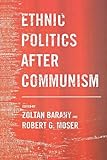Ethnic Politics after Communism / ed. by Zoltan Barany, Robert G. Moser.
Material type: TextPublisher: Ithaca, NY : Cornell University Press, [2018]Copyright date: ©2005Description: 1 online resource (296 p.) : 18 tables, 2 line figuresContent type:
TextPublisher: Ithaca, NY : Cornell University Press, [2018]Copyright date: ©2005Description: 1 online resource (296 p.) : 18 tables, 2 line figuresContent type: - 9781501720840
- Ethnic conflict -- Europe, Eastern -- Congresses
- Ethnic conflict -- Former Soviet republics -- Congresses
- Post-communism -- Europe, Eastern -- Congresses
- Post-communism -- Former Soviet republics -- Congresses
- Discrimination & Race Relations
- Political Science & Political History
- POLITICAL SCIENCE / Political Process / General
- 305.8/00947 22
- online - DeGruyter
| Item type | Current library | Call number | URL | Status | Notes | Barcode | |
|---|---|---|---|---|---|---|---|
 eBook
eBook
|
Biblioteca "Angelicum" Pont. Univ. S.Tommaso d'Aquino Nuvola online | online - DeGruyter (Browse shelf(Opens below)) | Online access | Not for loan (Accesso limitato) | Accesso per gli utenti autorizzati / Access for authorized users | (dgr)9781501720840 |
Frontmatter -- CONTENTS -- PREFACE AND ACKNOWLEDGMENTS -- Introduction: Nation-making among the Ruins of Empire -- 1. Rethinking Empire in the Wake of Soviet Collapse -- 2. Culture Shift in a Postcommunist State -- 3. Ethnic Mobilization in the Postcommunist Context: Albanians in Macedonia and the East European Roma -- 4. Ethnicity, Elections, and Party Systems in Postcommunist States -- 5. What Provokes Violent Ethnic Conflict? Political Choice in One African and Two Balkan Cases -- 6. Migration and Ethnic Politics in Eastern Europe and Eurasia -- 7. National Minorities in Postcommunist Europe: The Role of International Norms and European Integration -- CONCLUSION -- Notes -- CONTRIBUTORS -- INDEX
restricted access online access with authorization star
http://purl.org/coar/access_right/c_16ec
The Soviet Union encompassed dozens of nationalities and ethnicities, and in the wake of its collapse, the politics of ethnicity within its former borders and throughout Eastern Europe have undergone tremendous changes. In this book, Zoltan Barany and Robert G. Moser bring together eminent scholars whose theoretically diverse and empirically rich research examines various facets of ethnicity in postcommunist Europe and Eurasia: ethnic identity and culture, mobilization, parties and voting, conflict, and ethnic migration. The contributors consider how ethnic forces have influenced political outcomes that range from voting to violence and protest mobilization to language acquisition. Conversely, each chapter demonstrates that political behavior itself has an impact on the forms and strength of ethnic identity. Thus, ethnicity is deemed to be a contested, malleable, and constructed force rather than a static characteristic inherent in the attributes of groups and individuals with a common religion, race, or national origin.
Mode of access: Internet via World Wide Web.
In English.
Description based on online resource; title from PDF title page (publisher's Web site, viewed 26. Apr 2024)


